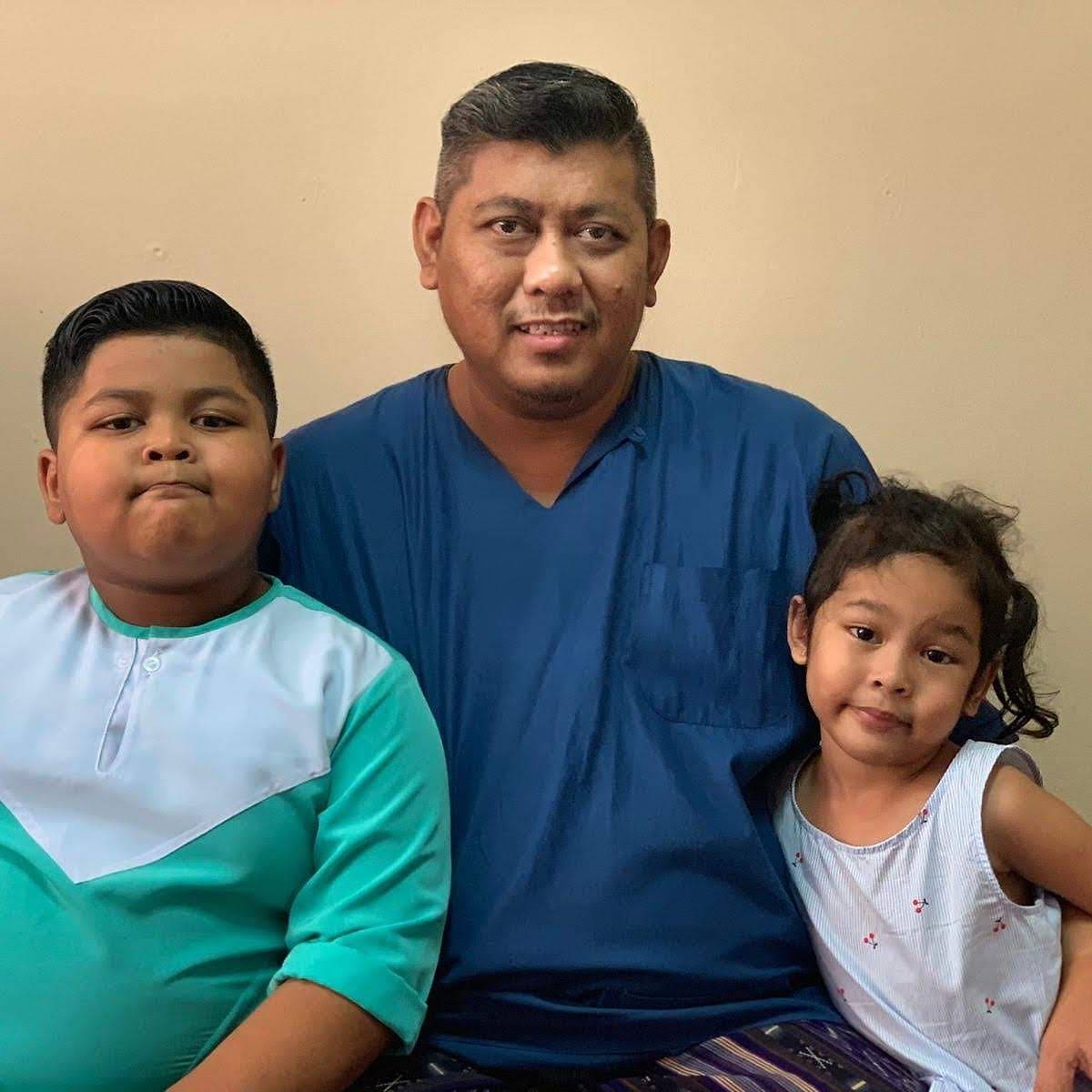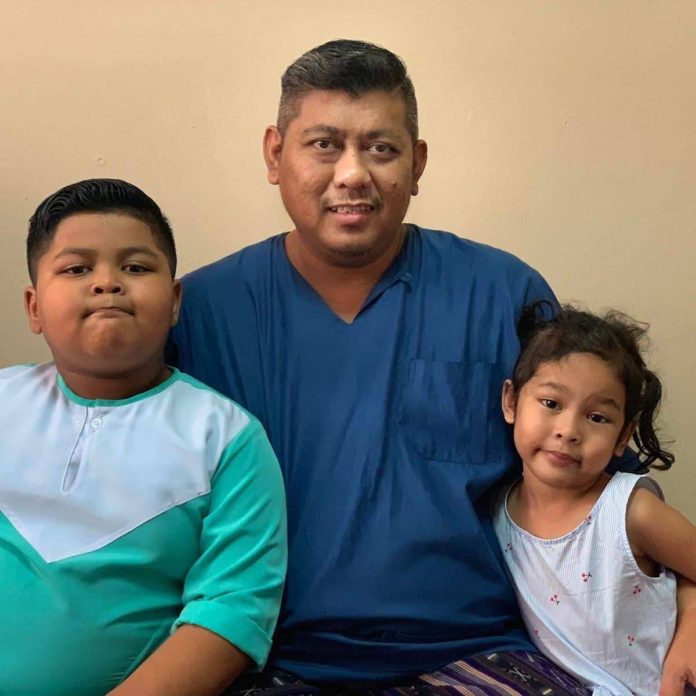SINGAPORE: It was still dark on Thursday morning (May 7) when Mrs Sharifah Radiah Ameer, 42, was jolted awake by her son, only to find her husband sitting against a wall looking pale and breathless.
For the previous few days, Mr Efendi Abdul Rahman, 43, had been dry coughing and slowly losing his sense of taste and smell.
Mr Efendi had visited a clinic the previous Saturday with similar symptoms and a 40-degree Celsius fever, but the doctor had checked his throat and lungs and said there was no suspicion of COVID-19.
To be productive earlier on during the “circuit breaker”, Mr Efendi had worked for three nights in an ad-hoc security role at a foreign worker dormitory in Tuas, Mrs Sharifah told CNA on Tuesday.
So that Thursday morning, there was little time to think.
Mrs Sharifah called the ambulance and her husband was rushed to Ng Teng Fong General Hospital, where he was admitted to the intensive care unit (ICU). He would later be tested for the virus too.
“The doctor said the test would take at least a day or so,” she said. “But I was surprised it came back earlier. I got a call from them at 2pm that day with the bad news. It’s not been the same for us at home since then.”
Life for the full-time homemaker and her family has since been one of home quarantine. She cares for her seven children and 87-year-old father with Alzheimer’s and early-stage dementia, and she worries she may not see her husband again.
Mr Efendi is still in the ICU in an induced coma. “As of Monday not much had improved, honestly,” Mrs Sharifah said. “His situation is still critical.”
ON QUARANTINE
With Singapore’s circuit breaker measures still in place and only daily updates from the ICU to rely on, Mrs Sharifah acknowledged that quarantine has been a “roller-coaster”.
“Other than being confined at home all the time, I am also bothered by the fact I can’t see my husband,” she said. “I have anxiety, so it’s really not great.”
She also has to deal with the thrice-a-day temperature taking and reporting. Thankfully, nobody in the family has shown symptoms so far. The youngest two of her children have tested negative too.
“I remember what I saw in my husband, so I would know and would immediately send (any of the kids) to the hospital for early care,” she said.
She has also had to deal with the occasional video and telephone calls from the authorities, to check if they are at home, or to conduct contact tracing.
“When we’re in such a situation, it gets irritating when people ask you the same questions so many times,” she said. “But I try my best to stay calm. I know they’re just doing their job.”

Mr Efendi Abdul Rahman with the youngest two of his children. (Photo: Sharifah Radiah Ameer)
But perhaps the biggest challenge is explaining their father’s condition to the children. Mrs Sharifah has five sons and two daughters aged 24 to six.
His absence is palpable. During the weekends before the circuit breaker, the family would go on brisk walks to the Chinese Garden in Jurong. Then they’d have breakfast together.
“I am very transparent about their father’s condition, especially to the older ones,” Mrs Sharifah said, stating that she shares every single detail. “The younger ones have a vague idea. But how do you explain mortality to children aged eight and six?”
The younger ones are also closer to their father. On some weekends, they would follow him to his office at an international school, where he works full-time as a safety and security supervisor. “His colleagues know them so well,” Mrs Sharifah said.
Mrs Sharifah acknowledged she sometimes breaks down, but tries to hide it from her children. Perhaps the children are also putting on a brave front, she said.
“My kids are pretty resilient,” she said. “They don’t really show their emotions. I don’t know why but it’s hard to break them. My girls are a lot different though. We do share more, and we kind of cry together.”
BANDING TOGETHER
The children have stepped up in bigger ways too. They help with the household chores, tidy up the kitchen, and have a “teamwork thing going on where they do the dishes turn by turn”, Mrs Sharifah said.
“They actually have become more united as siblings,” she added. “They help each other, they have no issues, no arguments. It wasn’t always like this I tell you, but I suppose in these times they realise ego needs to take a step back or two.”
With most of her children off from school – the eldest just finished full-time national service and the second eldest quarantined from her job as an auxiliary police officer – Mrs Sharifah sometimes plays games with them. They’re currently hooked on Uno.
The rest of the day is for doing the laundry and the extra chore of disinfecting. She washes clothes, especially those that have been in contact with her husband, in hot water. Then she sprays disinfectant around the house.
She also has to prepare her father’s meals and twice-daily medicine. He’s a bit fussy with his food, she says, so breakfast is usually Milo and bread with butter. Other than that, Mrs Sharifah says he doesn’t really need much attention.
And with most of the family fasting during the ongoing holy month of Ramadan, cooking has taken a back seat. Breaking fast is usually with rice and chicken or fish; the pre-dawn meal is normally cereal or leftovers from the previous day.
Mrs Sharifah said she doesn’t have to worry about these too as her son’s secondary school has been providing meals. Mr Efendi’s colleagues have pulled together to buy food for the family to break fast. Anonymous donors have come forward as well.
She’s “overwhelmed” by the outpouring of support. “I didn’t know how well-loved my husband was and how much impact he made to people’s lives,” she said. “I hope he can rest well knowing his family is well taken care of.”
AGONY AND REGRET
Mrs Sharifah admits, however, that she has trouble resting easy.
She depends on the calls from the ICU to find out how her husband is and what to expect, and even then she feels like she’s “in limbo”.
“The little information we get is basically like a repetition, almost like a broken record,” she said. “I cannot stand it anymore.”
She plans to ask doctors for an “honest prognosis” so she and her children can better prepare mentally. She said she spends every minute of her time worrying about him, “and not a minute goes by that he is not in my mind”.
“To be honest, I do worry about my husband not waking up. The prognosis isn’t promising, but I always try to make myself believe that he will fight this,” she said.
“But I won’t lie and say that I don’t think about how I would handle it if he passed on. Things trigger me; little things he did before he was hospitalised.”
Mrs Sharifah thought about how her husband, on the night before he was admitted, made soy sauce beef for breaking fast, even though she was never a fan of his cooking.
“I’m diabetic and his cooking is too sweet, but that night I had the beef and I can honestly say it was so heavenly,” she said.
“The same night he stood a while outside the room by the door watching me and my youngest two. He never did that before. Then he switched off the lights.”
Mrs Sharifah said she felt a “sense of foreboding” about her husband.
“I saw the red flags, and I did my best to get him medical attention, but I felt my best wasn’t good enough,” she said. “If anything happens, that is the regret I will live with for the rest of my life, I guess.”
“I NEED TO KNOW”
For now, Mrs Sharifah said it’s a case of wanting to do more for him but not being able to, especially as hospitals have barred most visitors due to the circuit breaker.
She had wanted to follow him to the hospital in the ambulance, but the attendant said the visitor lounge would be closed anyway.
“At the same time, it’s also a blessing because I don’t know how I’d react seeing him being tube-fed and everything,” she said.
“Because I’m so used to seeing the different side of him. He never showed his vulnerability to me. So if I saw him like this, I would probably break down.”
Still, she said there will come a point when she will insist on visiting him.
“For the sake of seeing him and my sanity, I need to know,” she said. “The idea of a COVID-19-related death is sad. The person is all alone. At most maybe a video call.”
Mrs Sharifah is concerned that she might never see him again, but said that Islam has taught her the concept of acceptance: “If that time comes, I will be okay.”
“He was my rock just as I was his,” she continued. “We had a difficult and imperfect marriage, but we were beautifully imperfect. And I miss him terribly.”
BOOKMARK THIS: Our comprehensive coverage of the coronavirus outbreak and its developments
Download our app or subscribe to our Telegram channel for the latest updates on the coronavirus outbreak: https://cna.asia/telegram





